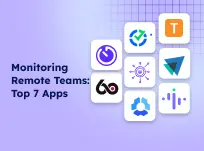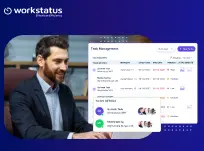Table of Contents
In the United States of America, monitoring employees is a completely legal activity. Almost all federal and state laws permit employers to monitor their owned devices (used by employees), especially where there lies the business intent.
Employers can monitor their employees’ attendance, productive time, activities on the internet, screen content, keystrokes, emails, communication, and more. But, employers need to be aware of the state and federal laws governing employee monitoring so they can ensure their company is continuously following the right regulations.
In this blog, we’ll cover the various employee monitoring laws of the United States and mention certain exceptions to these laws to help you understand the legal implications of employee monitoring.
So without any further ados, let’s get started with our first topic.
Is it legal to monitor employees in the USA?
Yes, in the United States of America it is legal and encouraged to employers to consider, to some extent, monitor employees’ activities on workplace devices. But, such monitoring needs to be validated with logical business reasons from the organizations.
Some states, however, ask for consent from employees before monitoring. But, as far as, Federal laws are concerned employers have no restrictions/requirements to disclose staff monitoring.
Monitoring employees’ internet and social media activities are legal?
Yes, mostly in all cases, employers have the legal right to ensure that the employees are using the workplace’s internet for only work-related jobs.
Employee Monitoring Laws in the U.S. allow employers to track the internet activities of employees’ websites visited, URLs opened, and the amount of time spent on all sites, and even restrict some websites.
In some states of the U.S., it is permissible for employers to carry out pre-employment background checks on employees before hiring them. In this, they might even ask for social media credentials as a completely legal formality.
This allows employers to maintain complete transparency in the workplace and make sure that their employees are not misusing the internet for personal use.
How legal is it to monitor screen captures and keyboard usage?
It is completely legal for employers to monitor screen captures and keyboard usage in the USA. Simply put, in the U.S., it is completely legal to monitor each and every activity an employee undertakes during working hours because it is considered part of the employer’s prerogative to ensure their employees are following the rule and regulations set forth by the company.
Is it legal for employers to Monitor email content?
Yes, under United States law, any email that an employee sends or receives on a company’s computer comes under the radar of monitoring. Being received on the company’s devices, they can be monitored and assessed whenever and however the employer pleases.
This is because any emails sent or received on the company’s network become a part of the employer’s property, and they reserve the right to access them for complete transparency and accountability.
Though in some states, consent is necessary, majorly is defined as legal under federation laws. For example, in California, third-party consent is necessary before accessing emails to protect employee privacy.
Is monitoring and recording phone conversations also legal?
Yes, but only on devices owned by the company because they are the company’s property and can be only used for official purposes. The addition to the fourth amendment of the Electronic Communication Privacy Act (ECPA) of 1986, however, states that it is illegal to intercept any type of communication, wire, oral, or electronic. But, there are some exceptions like:
- Business-related exception where employers are allowed to monitor calls only if they have legitimate reasons to support their cause.
- Prior-consent exception stated by Federal says that recording of the phone is permissible if even one party agrees and gives consent for same. Though this law has its own amendments in every state.
Is video monitoring of systems also legal in the U.S.?
Yes, Federal laws in the U.S. let you use the video monitoring of systems in the office as long as it is done specifically and only for business purposes. However, some states such as California and New York still have restrictions of the usage of video monitoring systems in locker rooms, restrooms, and certain areas that need not monitoring.
Video recording must not include audio as per Employee Monitoring Laws from a federal wiretap.
Do monitoring employees’ personal devices also come under laws?
In some instances, Yes. If an organization has a policy of bringing its own devices for employees it can track their activities. But, this requires prior information and consent from employees. Also, this tracking is strictly for only job-related tasks.
Do organizations need to inform employees about their monitoring?
Informing employees beforehand of their monitoring is required in only 2 states of the U.S. This is because the state’s laws in the U.S. vary in some states like Connecticut Gen. Stat.§ 31-48d and Delaware Del. 6 Code § 19-7-705 and thus require pre-information of monitoring.
Is employer monitoring policy important in the U.S?
Yes, in the U.S. policies and codes of conduct are of utmost importance in any organization. It is recommended that all organizations must have employee monitoring policies like:
- Be very precise and clear with your policies
- Clearly define what and to which extent will be monitored.
- Ensure written acknowledgement from employees.
- State and inform little or no privacy of usage from the company’s properties.
- Set restrictions on sharing personal data with a third party.
Are there any laws protecting employees’ privacy in the U.S.?
While ensuring the privacy of employers, the U.S. has not forgotten about employees’ privacy too.
United States Data Protection Laws of 1998 put employers under critical obligation to protect their employees’ sensitive information safe at any cost. Along with that, there are federal and state laws that protect employees’ privacy at the workplace.
Two of such Employee Monitoring Laws are the Video Privacy Protection Act and the California Consumer Privacy Act (CCPA) that allow the employees to seek details of their private information that has been accumulated by the employers.
Finally,
The United States has tried to, very intelligently, manage and even out the need for privacy and monitoring at the workplace. Having said that, transparency in the workplace is always a good practice.
Set up clear and definite policies in place and announce them clearly into the organization. Having a clear set of policies impacts the companies growth by moving it in the right direction.
Next step
By following all the laws and policies, you are now ready to monitor the employees the right way. The best way to start effective employee monitoring is by choosing the right employee monitoring software that not only abides by but also helps you adhere to these laws and policies, and Workstatus is one such solution.
Workstatus helps you do exactly that. It records employee activities and provides detailed reports, which can be used to ensure compliance with laws and policies, as well as to take corrective measures when necessary.
Each of the features of Workstatus, like time tracking and activity monitoring with screenshots, is customizable to the number of screenshots and if there are no screenshots at all. Check them out if you want a completely law-abiding time tracking and monitoring software.
It is convenient, simple, and hassle-free.
Conclusion
The Employee Monitoring Laws in the U.S. permits employers to track employee activities on workplace devices and resources, but with restrictions. The employer must inform their employees about the type of monitoring they are going to do unless specified by state laws.
But, with the help of Workstatus, you can efficiently monitor your team’s time, productivity, and performance according to U.S. law which makes it a great pass for excellent productivity in 2021!
FAQs
Q- Are there any restrictions on employee monitoring?
A- Yes, certain states do have limitations and guidelines that employers must follow when monitoring employees. Generally speaking, consent is required from the employee before their activities can be monitored.
Additionally, employers should avoid collecting data that could be considered private or sensitive such as social security numbers and banking information, to comply with state and federal laws and to maintain the trust of their workforce.
Q What are the implications of employee monitoring?
Employee monitoring can have both positive and negative implications for employers. On the one hand, it can help increase productivity, improve data security, and reduce costs associated with wasted time or resources due to misuse.
On the other hand, if done improperly, it could cause a lack of trust in the workplace as well as legal issues if certain laws were violated. Employers should always consult their state’s labor laws prior to implementing any form of employee monitoring to ensure compliance.












